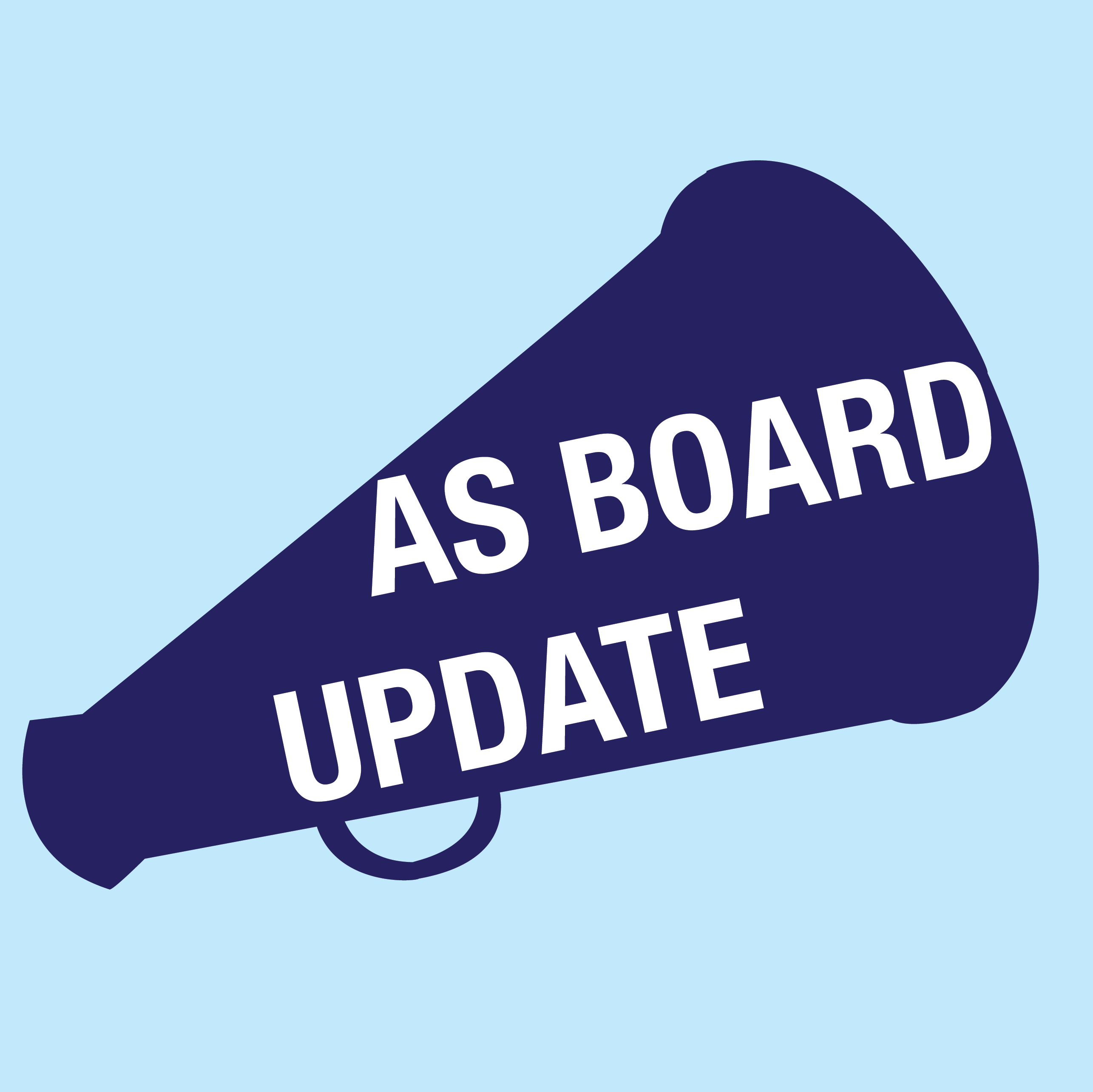AS Executive Board update graphic PJ Heusted // AS Review
By PJ Heusted
The Associated Students Executive Board met on Friday, Mar. 5 for their nineteenth meeting of the 2020-21 academic year.
Black Student Organization Demand Updates
President Abdul Malik Ford said that the board’s website needs to be updated to reflect the board members’ work towards fulfilling the BSO demands. He asked that the other board members create a bullet pointed list of what work they would like to see reflected on the website and sent that to Hunter Stuehm, AS communications director, as soon as possible.
Senate Pro-tempore Sargun Handa said that she recently spoke with Provost and Vice President of Academic Affairs Brent Carbajal about the timeline for the creation of a Ethnic Studies institute, program or college at Western and that it appears that funding can be secured in April.
Housing Budget Proposal
Associate Director of University Residences Kurt Willis spoke as a guest to present the current housing budget proposal for 2021-22 looking for feedback from the board.
The proposal describes a move to a tiered pricing program for rooms. 65% of beds will exist at the most basic level, 19% will be priced in a middle tier and 17% will be at a premium price. There will be a 4.5% price increase for beds at the most basic tier, a 7.9% increase at the middle tier and a 14.4% increase at the top tier. These percentages include the price increases for the combination of housing and dining.
Handa asked about how the housing and dining system plans to maintain safety precautions to control the spread of COVID-19 once students move back on campus.
Willis said that their estimate of 15-80% dorm occupancy comes from the plans for other schools as well as guidance from the Health Department. He said that students with an on-campus presence will still be required to do regular check-ins with staff to monitor symptoms and spread.
Ballard said that she was concerned about how continuing to increase prices will affect students who already struggle to afford to live on campus especially during the on-going pandemic. She shared concerns about the tiered model and how it may create a hierarchy of students on campus depending on who can afford to live in which rooms.
Willis said that the tiered model reflects that some rooms on campus do have greater perceived value and that students currently subsidize the nicer rooms by having a greater average payment for all students.
Ballard said that she has seen three housing budget proposals in her time involved with the AS and that each time there is an increase. She said that the annual increases continue to create a burden for students who are not seeing an improvement in student experience despite paying more.
The proposal will return to the agenda next week for further discussion and a possible advisory vote.
Elections Advisory Committee Charge and Charter
AS Elections Coordinator Mario Alem shared tracked changes to the charge and charter for the Elections Advisory Committee.
Alem said that the document was out of date and needed to be updated. He noted changes including the membership to involve either a board or senate member and added that no student running in an AS election can also serve on the committee at that time.
Spring Elections Timeline
Alem shared the current timeline for AS elections this spring. This timeline comes to follow up the previous decision to move all elections to the spring.
Candidate filing will run from April 12 to April 30, campaigning will begin May 1 and elections will be held from May 10 to 14.
Student Technology Fee Committee Charge and Charter
Handa said that she is now hearing mixed feelings about the plan to change the chair of the committee from the Senate Pro-tempore to the VP for Student Services.
Handa said that she is hoping to delegate this job to someone else given her current workload, but said that she is willing to continue as the chair pending feedback from a meeting with the committee to discuss their thoughts and needs.
She suggested appointing one of the Vice Chairs of the Student Senate to chair the committee instead of the senate pro-tempore, if they felt that was necessary in any given year.
New Grievance Model Proposal
Ballard presented an outline of her proposal for a grievance model to replace the current process for filing and handling grievances during AS Elections.
Ballard’s model outlines a three-step process to handle the filing, hearing and appeals processes. Phase one involves a resident director [RD] and hired student coordinator to oversee the creation and management of four ethics board panels during phase two. These ethics board panels each consist of 3 at-large students who would be selected at random from the entire student population. Phase three, if needed, involves five at-large students, Associate Dean for Student Support Services Michael Sledge and student coordinator from before to participate in an appeals board panel. The RDs, Sledge and student coordinator will have no decision-making powers or privileges and participate only to oversee the process.
Handa said that she is concerned about the random selection of at-large given that Western is predominantly white and that means that these panels will also likely be predominately white. She suggested using an application and appointment model similar to the one used for committees.
Ballard said that she participated in a lot of conversations about that same concern and they considered using an application and appointment model, but worried that the same problems the AS already experiences with seeing only students who already have a connection to the AS apply. She said they also considered appointing a certain number of students from each college or other programs on campus.
Ballard plans to present this proposal to the student senate as well as bringing it back to the board next week for further discussion.

